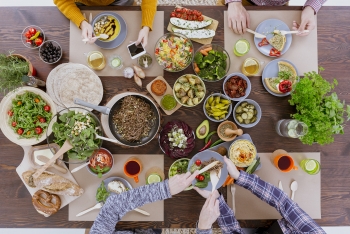5 Top food, beverage & hospitality trends to watch out in 2019

What is a trend, by the way? According to the TrendsObserver, trends are changes that typically occurs across a large numbers of consumers. And therefore created by changes in political, economic, social-cultural and technological environments. A trend will no be in the past, but as a prediction of something that will happen and somehow accepted by the population in general.
That leads us to the understanding of how important being a trend watcher in our area of expertise is. “The opportunity for us is not only to be ahead of the trend but to understand who tomorrow’s customer will be, what fulfills their needs and how we can be ready to meet that demand”, says Patrick Berwald, Benchmark’s vice president food and beverage, a global hospitality company.
After digging in the most renowned reports and sources in the industry, our founder Filipa Valente has selected the TOP 5 trends she really believes we will be experiencing pretty soon.
#1 Experience Economy
Yeap. The millennials have definitely changed the game. They want memories and not things. The Millennial generation – and the growth of social media – has taken this economy in some unexpected directions. With Instagram, every experience must be photogenic. And when it comes to food, we are eating with our eyes, more than never before. This is a trend we have been noticing more and more. And sure enough it will become stronger. When our foodie explorers come do Lisbon, they don’t want to sit down and have a slice of pizza. They want to have an authentic taste of where they are.
#2 Farm to Table 2.0.
One trend that has been in the works for some time now, of course, is the farm to table movement. It has recently taken a brand-new path and that is the chef/farmer movement of custom farming in regard to specifying what seeds are being planted for new menu development. The idea is making the relationship between dining establishments and farming closer and ultimately more sustainable. We see partnerships between farms and restaurants, boutique hotels and even farm food experiences now in a rise.
#3 Plant-based food movement
The vegetarian factor. Yes, we have been watching out for our macro diet at home or when dining out. Sustainability is not only a pretty word coming from a corporate perspective. It has been an ordinary concern. Something like the girl next door. Menus are and will keep seeing a large portion dedicated to vegetarians and what is plant-based and coming from the ground. Dishes and dining places are even becoming vegetable focused, with proteins as the complement.
#4 Hyper-local supply chains
Hyper-local refers to food that is locally sourced or grown in-house, such as restaurant gardens. Having consumers caring not only for sustainability, but also transparency with a bold sense of local community, letting them know the the ingredients come from is a big plus. They appreciate freshness, nutrition and authenticity.
#5 Moderation is the new mainstream
Tea parties in a rise, top beverage players going for non or low-alcohol products, Dry January. No-alcohol drinks are becoming a more common lifestyle choice. It seems like millennials are again the drivers of this a many other trends to come. They have grown after all and are drinking significantly less than their parents, it is no longer uncool or unusual to be teetotal – one in five Brits now doesn’t drink. Bartenders are taking their non-alcoholic cocktails increasingly seriously, rather than treating them as an afterthought.
